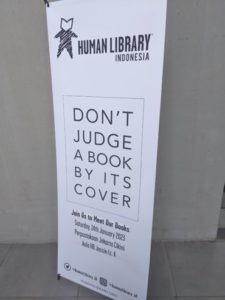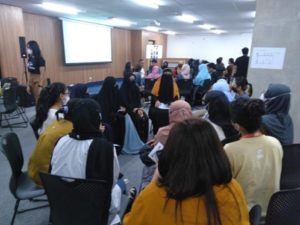How libraries contribute to the SDGs: A story from the Human Library in Indonesia 2023
23 October 2023
Human Library in Indonesia
Libraries as public institutions aim to empower humans and introduce an inclusive environment to the public through collections and programs. Library collection in the future will not only be in printed or recorded form but needs to be developed in the form of a living collection. Everyone’s experience is knowledge and reading it will make people wiser by respecting each other without labeling or judging.
The Human Library Organisation held a programme with the hashtag #UnjudgeSomeone on January 14, 2023 at the Jakarta Cikini Library in Central Jarkata. The aim of the event was to provide an opportunity for everyone to hear stories from living collections based on their life experiences. Collections are people who have been stigmatized by society. This stigma arises because of prejudice and a lack of knowledge, which creates misinformation and leads to negative views. At the start of the session, we were given instructions about what collections were there, how to interact with the collections, and what interactions were allowed and not allowed to the collection. The human library collections included 7 human books, namely, Journalists, Widows, HIV+, Niqabi, Autism, AYLA (Child Abuse) and Bipolar.
The use of the human collections was quite simple. People could visit any collection that did not have any readers or that had readers but had not started yet. Then, people could get acquainted with the collection.. The collection would tell a story for about 30 minutes. People could also ask questions during the Question-and-Answer segment. People could also give positive responses to the collection or respond supportively in the form of hugging (with consent). After the reading time is over, people could thank the collection or ask for collection-related contacts such as community or personal contacts (with consent and permission).
Subsequently, readers could continue to read other collections or ask the committee about the human library program. Based on the experience of reading collections in the human library, there are usually 7-12 readers at one collection at the same time. The system was not one-on-one. Each reader would also be given a card that can be filled in after a collection has been read.
Feisal as manager of the human library explained that each collection had been curated and ensured that it could become a collection. Human library program is also carried out with direct assessment from the human library center in Copenhagen, Denmark, with the aim that the values applied by the human library will be maintained in any country that adopts them.
Collection selection and evaluation was also carried out strictly to adapt to the conditions of Indonesian society. The human library recognised that the collections are people who still faced a lot of stigma and discriminatory treatment. This happens because there is still public misinformation about certain groups of people.
Contributed by Soraya, Hariyani Putri, National Library of Indonesia


Human Library and SDGs
The UN 2030 Agenda is a universal call to action to end poverty, protect the planet and ensure that everyone, everywhere enjoys peace and prosperity. The SDGs are interconnected – often the key to success for one will involve tackling issues more commonly associated with another.
The 17 Sustainable Development Goals (SDGs) anchors the UN 2030 agenda, and the Human Library itself comes under the 16th sustainable development goals of Peace, Justice, and Strong Institutions (SDG 16). Libraries are a key source of information for the public. They are also equipped to teach and enable citizens to benefit from this open access. Libraries are a trusted information source, with skilled staff that help individuals, institutions and governments to communicate, organise, structure and use information in a meaningful way to promote development.
The Human Library helps to overcome stigma, combat prejudice, dismantle stereotypes, inform ignorance, clarify misconceptions, debunk myths, end discrimination, and challenge negative attitudes through conversations with Human Books. Common goals and targets shared by the Human Library and SDGs include:
- Ensure responsive, inclusive, participatory, and representative decision-making at all levels. The role of Human Libraries in this instance is a platform for which a safe and equal environment is created for both the human books and readers to share their experiences.
- Broaden and strengthen the participation of developing countries in the institutions of global governance. Human library activities can provide insight for government policies that impact all levels of society.
- Ensure public access to information and protect fundamental freedoms, in accordance with national legislation and international agreements. IFLA in Statement on Libraries and Intellectual Freedom states:
“IFLA believes that the right to know and freedom of expression are two aspects of the same principle. The right to know is a requirement for freedom of thought and conscience; freedom of thought and freedom of expression are necessary conditions for freedom of access to information”
The Human library is open to everyone and protects intellectual freedom with the force of law that applies nationally and internationally.
- Promote and enforce non-discriminatory laws and policies for sustainable development. The Human Library upholds the belief that all humans have the right to be protected from discrimination and reaffirms the goals of SDG 16. Sustainable development in the human field requires intellectual, emotional and spiritual intelligence that goes hand in hand so that the policies made can benefit the society.
In conclusion, the human library function as an essential resource for inclusive, sustainable development, through providing meaningful access to information for all.
References
Anne van den Dool. (2022). The human library in the Netherlands: a successful exchange of life stories. Bid journal: Universitat of Barcelona. DOI https://dx.doi.org/10.1344/BiD2022.48.04
IFLA How libraries contribute to sustainable development & the SDGs. IFLA ALP: building better library communities. Accessed April 21, 2023, <https://www.ifla.org/wp-content/uploads/2019/05/assets/alp/103-fbradley-alp.pdf>
IFLA Libraries and the Sustainable Development Goals: a storytelling manual. Accessed April 21, 2023, <https://www.ifla.org/wp-content/uploads/2019/05/assets/hq/topics/libraries-development/documents/sdg-storytelling-manual.pdf>
IFLA Statement on Libraries and Intellectual Freedom. Accessed April 21, 2023, <https://repository.ifla.org/bitstream/123456789/1424/1/ifla-statement-on-libraries-and-intellectual-freedom-en.pdf>
The Danish Institute for Human Rights. (2017). Human Rights and The SDGs Pursuing Energies
University of Warwick. Human library: unjudged someone. Accessed April 21, 2023, <https://warwick.ac.uk/services/library/pghub/social/humanlibrary/>